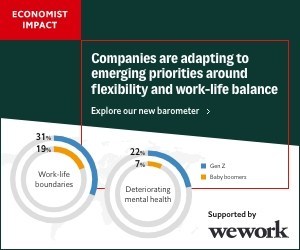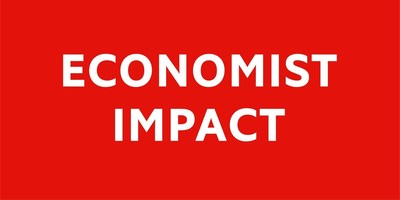|
02.02.2022 12:00:00
|
New research reveals business leaders and employees hold differing views on how the pandemic has affected work-life balance and productivity
LONDON, Feb. 2, 2022 /PRNewswire/ -- Workers at different seniority levels disagree on how remote working impacted their work-life balance and productivity, according to new research from Economist Impact, which drives progress on the world's biggest issues with world-class policy research and global media amplification.
The study, which was produced with the support of WeWork (NYSE: WE), surveyed business leaders (director and C-suite level) and employees (manager level and below) between August and October 2021 on how new hybrid working habits affected their personal and professional lives. Both survey samples were drawn from ten cities1 in the US, the UK, France, Germany, Singapore and Australia, and across a range of industries.
Only a quarter of employees reported a positive effect on their productivity levels and less than a third on maintaining a healthy work-life balance during the first 18 months of the pandemic, compared to six in ten business leaders who reported a positive impact on both productivity and work-life balance.
For business leaders, flexibility—with the opportunity to work remotely—is key for their own work-life balance. For employees, visiting the office is an important way to help maintain boundaries between work and their personal life as well as engage in face-to-face interaction for learning, development and career progression.
"At the beginning of the pandemic, when a huge number of the global workforce were forced to work from home, employees in less senior roles really suffered both in terms of their work-life balance and their productivity. Business leaders, on the other hand, seemed to benefit: they reported better work-life balance and increased productivity," said Jonathan Birdwell, Regional Head (EMEA), Policy & Insights at Economist Impact.
"The discrepancy may be explained by employees reporting less flexibility during the pandemic compared to business leaders, less access to remote working equipment and ascribing a greater importance to having an office to help maintain separation between their personal and professional lives," added Birdwell.
Key findings from the research that provides insight into priorities and work-life balance in a hybrid working environment include:
- Employees in less senior positions display a "segmentor" mindset, preferring to keep their work and personal lives separate.2 Over half (56%) of employees enjoy going to the office because it allows them to keep their professional and personal obligations separate. However, regional and demographic disparities suggest companies should take a tailored approach that considers different cultural needs and expectations.
- Workers at all seniority levels who are offered flexible working arrangements that include working remotely at least three days a week report more positive work-life balance. A majority (59%) of business leaders who reported a flexible working arrangement of working remotely at least three days a week during the pandemic reported a positive effect on their work-life balance, compared to only 23% of those who did not have a similar arrangement. The effect was similar but smaller for employees in less senior roles: a third (30%) of employees with flexible arrangements that included at least three days working remotely reported a positive effect compared to only a fifth without such an arrangement.
- Businesses can expect more demands for greater flexibility from staff at all levels. The top priorities for workers post-pandemic, in terms of maintaining a healthy work-life balance, include greater flexibility over working hours and the ability to work remotely.
- Workers at all seniority levels with hybrid working arrangements display the highest level of satisfaction with their company's return to office plans for the future. Eight in ten employees (81%) and over three-quarters of business leaders (77%) who have flexibility over how many days they are expected to work in the office feel that their organisations are striking a good balance between work hours and personal hours. Among those required to work fully remotely or in the office full-time, only 54% of employees and 48% of business leaders are satisfied with their company's workplace strategy.
- Businesses need to prioritise office safety and give managers the right technology and training to make hybrid models work. Time in the office is important to workers at all levels, but the majority of workers want flexibility over how often they go into the office. Policies around offices and workspaces need to ensure that they are addressing employees' concerns about feeling safe in busy offices. Senior managers charged with the responsibility for managing hybrid workforces need skill-based training and technologies to help manage a remote workforce.
Explore Economist Impact's Work-Life Balance Barometer, which provides a snapshot of the new world of work in ten cities; London, Berlin, Paris, Singapore, Sydney, San Francisco, Los Angeles, Boston, Washington, DC and New York City.
About Economist Impact
Economist Impact combines the rigour of a think-tank with the creativity of a media brand to engage a globally influential audience. We believe that evidence-based insights can open debate, broaden perspectives and catalyse progress across three core areas of expertise and leadership including sustainability, new globalisation and health. The services offered by Economist Impact previously existed within The Economist Group as separate entities, including EIU Thought Leadership, EIU Public Policy, Economist Events and SignalNoise.
Our track record spans 75 years across 205 countries. Along with creative storytelling, events expertise, design-thinking solutions and market-leading media products, we produce framework design, benchmarking, economic and social impact analysis, forecasting and scenario modelling, making Economist Impact's offering unique in the marketplace. Visit www.economistimpact.com for more information.
_____________________________
1 London, Berlin, Paris, Singapore, Sydney, San Francisco, Los Angeles, Boston, Washington DC and New York City
2 Research on work-life balance from University of Pennsylvania Professor Nancy Rothbard, who was on the Advisory Board for this project, deploys a spectrum of employee preferences: on one side of the spectrum are employees who prefer to integrate work and personal life ('integrators'), whereas on the other side of the spectrum are employees who prefer to keep work and personal life separate ('segmentors'). https://cccba.org/flyer/2020/2020-ed-series/2020-education-series-7-materials.pdf
![]() View original content to download multimedia:https://www.prnewswire.com/news-releases/new-research-reveals-business-leaders-and-employees-hold-differing-views-on-how-the-pandemic-has-affected-work-life-balance-and-productivity-301473596.html
View original content to download multimedia:https://www.prnewswire.com/news-releases/new-research-reveals-business-leaders-and-employees-hold-differing-views-on-how-the-pandemic-has-affected-work-life-balance-and-productivity-301473596.html
SOURCE Economist Impact
 Der finanzen.at Ratgeber für Aktien!
Der finanzen.at Ratgeber für Aktien!
Wenn Sie mehr über das Thema Aktien erfahren wollen, finden Sie in unserem Ratgeber viele interessante Artikel dazu!
Jetzt informieren!
Nachrichten zu WeWork (The We Company)mehr Nachrichten
| Keine Nachrichten verfügbar. |

